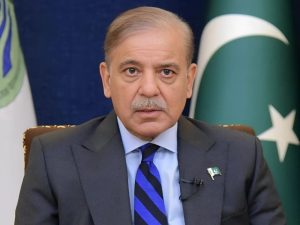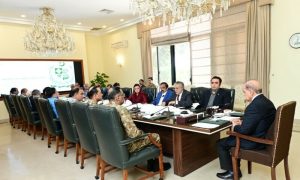On Thursday, Pakistan’s civil and military leaders sent a clear message to India: any attempt to stop or divert its share of water would be seen as an act of war, as tensions between the two nuclear-armed neighbors escalated into a serious crisis.
This warning came just a day after India made a bold move to suspend the 1960 Indus Water Treaty, citing the Pahalgam attack—which it blamed on Pakistan—as the reason. In response, the high-powered National Security Committee (NSC) convened an emergency session to assess the situation.
Led by Prime Minister Shehbaz Sharif, the meeting included the chiefs of the three armed services, senior cabinet members, and other key officials.
The urgency of the meeting was prompted by India’s unprecedented actions, which included putting the water agreement on hold, closing the Wagah-Attari border, expelling Pakistani military advisers, and even hinting at possible military action.

During the discussions, the civil-military leadership examined the fallout from the Pahalgam attack and analyzed India’s swift reaction. They also considered the risks of any potential misadventure by India and how Pakistan should respond.
It was firmly decided that Pakistan would not yield to Indian pressure and would respond appropriately through both diplomatic channels and other means.
After the meeting, a statement was released that categorically dismissed India’s allegations of Pakistan’s involvement while expressing deep concern over the loss of life.
“Expressing concern over the loss of tourists’ lives, the Committee reviewed the Indian measures announced on April 23, 2025, labeling them as unilateral, unjust, politically motivated, extremely irresponsible, and lacking any legal basis,” the statement noted.
In direct response to India’s actions, Pakistan strongly rejected the announcement to suspend the Indus Waters Treaty.
The Treaty is a binding international agreement facilitated by the World Bank, and it doesn’t allow for any unilateral suspension. Water is a crucial national interest for Pakistan, serving as a lifeline for its 240 million citizens, and its availability will be fiercely protected. Any attempt to halt or redirect the flow of water that belongs to Pakistan under the Indus Waters Treaty, as well as infringing on the rights of lower riparian states, will be viewed as an Act of War and met with a full spectrum response of National Power,” it warned.
Highlighting India’s reckless and irresponsible actions, which blatantly ignore international conventions, UN Security Council Resolutions, and its obligations, Pakistan has decided to put all bilateral agreements with India, including the Simla Agreement, on hold until India stops its ongoing support for terrorism within Pakistan, transnational killings, and its failure to adhere to international law and UN Resolutions regarding Kashmir.
Additionally, Pakistan announced the immediate closure of the Wagah Border Post. All cross-border transit from India through this route will be suspended without exception. Those who have crossed with valid endorsements are allowed to return through this route immediately, but must do so by 30 April 2025.
“Pakistan is suspending all visas issued to Indian nationals under the SAARC Visa Exemption Scheme (SVES), and these visas are considered cancelled effective immediately, except for Sikh religious pilgrims. Indian nationals currently in Pakistan under SVES are instructed to leave within 48 hours, with the exception of Sikh pilgrims.”
In a reciprocal action, Pakistan has declared the Indian Defence, Naval, and Air Advisors in Islamabad as persona non grata. They are required to leave Pakistan immediately, but no later than 30 April 2025. “These positions in the Indian High Commission are now annulled. The support staff for these Advisors are also instructed to return to India.”
The Indian High Commission in Islamabad will see its strength cut down to 30 diplomats and staff members starting from April 30, 2025.
In a similar vein, Pakistan has decided to close its airspace immediately to all airlines that are either Indian-owned or operated by India.
Additionally, all trade with India, including any transactions involving third countries through Pakistan, is now suspended without delay.
The National Security Committee emphasized that Pakistan and its Armed Forces are fully equipped and ready to defend their sovereignty and territorial integrity against any threats, as clearly shown by their measured but firm response to India’s aggressive actions back in February 2019.
In summary, India’s aggressive actions have reaffirmed the Two-Nation Theory and echoed the concerns of Quaid-e-Azam Muhammad Ali Jinnah, as highlighted in the 1940 Pakistan Resolution, which still resonates with the entire Pakistani Nation.
The people of Pakistan are dedicated to peace, but they will not allow anyone to infringe upon their sovereignty, security, dignity, or inalienable rights.
The National Security Committee also noted that Kashmir remains an unresolved issue between Pakistan and India, as recognized by various UN resolutions. Pakistan continues to advocate for the self-determination rights of the Kashmiri people.

“The ongoing oppression by the Indian state, the stripping away of statehood, and the political and demographic manipulation have consistently sparked a genuine backlash from the people of IIOJK, fueling cycles of violence. The systemic persecution of minorities, especially Muslims, in India has become increasingly widespread. The recent push for the Waqf Bill is just the latest attempt to marginalize Muslims throughout the country. India needs to resist the urge to take advantage of such tragic events and must fully own up to its failure in ensuring the safety of its citizens.”
It stated that Pakistan has firmly condemned terrorism in all its forms. “As the frontline state in the fight against terrorism, Pakistan has endured significant human and economic losses. India’s efforts to create instability along Pakistan’s eastern borders are clearly aimed at diverting attention from Pakistan’s counter-terrorism initiatives. Without credible investigations and verifiable evidence, any attempts to link the Pahalgam attack to Pakistan are baseless, illogical, and simply don’t hold water.”
It emphasized that India’s tired narrative of victimhood cannot hide its own responsibility for fostering terrorism on Pakistani soil, nor can it distract from its systematic oppression and human rights abuses in IIOJK.
In contrast to Indian assertions, Pakistan possesses undeniable evidence of Indian-sponsored terrorism within its borders, including the confession of an active Indian Navy officer, Commander Kulbhushan Jadhav, who stands as a living proof of India’s state-sponsored terrorist activities.
The National Security Committee expressed concern over the implicit threat found in the Indian statement.
The international community needs to keep a close eye on India’s state-sponsored extraterritorial assassinations or attempts on foreign soil. These shocking acts blatantly violate international law, as recently highlighted by Pakistan along with several other nations, all backed by undeniable evidence. Pakistan is committed to pursuing everyone involved—both the planners and the perpetrators—to ensure justice is served. Any threat to Pakistan’s sovereignty and the safety of its people will be met with strong reciprocal actions across all fronts.
The message is clear: India should stop its knee-jerk blame game and the cynical, staged exploitation of incidents like Pahalgam to push its narrow political agenda. Such tactics only serve to heighten tensions and hinder the path to peace and stability in the region.
The irresponsible warmongering from Indian state-controlled media, which stirs up volatility in the regional landscape, is truly reprehensible and calls for serious reflection.
Meanwhile, Pakistan’s Defence Minister Khawaja Asif has issued a warning: if India thinks it can engage in any adventurous actions on Pakistani soil, it should not be under any illusions—it will face the consequences.
Speaking at a news conference in Islamabad after a National Security Committee meeting, flanked by Deputy Prime Minister Ishaq Dar and other federal ministers, the Defence Minister emphasized that if Pakistani citizens are not safe, India will also have to deal with the fallout. He mentioned that there is intelligence suggesting India is planning terrorist activities in Pakistani cities.
He further stated that if India conducts any operation in a Pakistani city that harms any Pakistani citizen, there will be a reciprocal response.
Khawaja Asif added that while Pakistan condemns terrorism wherever it occurs—including in India—it fully reserves the right to defend itself.
In a pointed accusation against India, he claimed that terrorists, including members of the TTP, are operating out of Afghanistan, asserting that the roots of terrorism in Pakistan can be traced back to India. He referenced Kulbhushan Jadhav as clear evidence of India’s involvement in terrorist activities.
The Defence Minister further alleged that leaders of the banned Baloch Liberation Army and Tehrik-i-Taliban Pakistan are residing in India and even receiving medical care there. He made it clear that no one should be under any illusions—Pakistan is fully prepared and will respond decisively to any provocations from India.
“Just as we reacted strongly to the Pulwama incident in the past, we will deliver a similar response if India attempts any such actions again. We will not bow to any international pressure.”
Deputy Prime Minister and Foreign Minister Ishaq Dar stated that significant decisions were made during the National Security Committee meeting, labeling India’s allegations and actions as reckless. He mentioned that a statement had already been released.

The Foreign Minister also noted that the permanent members of the United Nations Security Council had welcomed Pakistan’s statement, viewing it as a positive development.
He strongly condemned India’s unilateral decision to suspend the Indus Waters Treaty, calling it unacceptable. He emphasized that India cannot take such a step since the World Bank is a guarantor of the treaty, which does not include any provision for unilateral suspension.
Dar warned that any interference with the treaty, including the diversion or cessation of water, would be regarded as an act of war, as stated in the issued statement. If India proceeds with such actions, Pakistan will take all necessary measures.
In response to a question, the Foreign Minister criticized the Indian government for its irresponsible behavior, making unfounded accusations without any evidence. He challenged India to present any proof it might have, adding that Pakistan possesses evidence of foreign militants in Indian-occupied Kashmir armed with heavy weaponry, allegedly supported by Indian intelligence agencies.
He emphasized that Pakistan is keeping its friendly nations informed and is managing its affairs independently, without depending on anyone else.
At the same time, Information Minister Attaullah Tarar, during a press conference, stated that India’s actions are nothing but empty threats and bravado. He pointed out that Pakistan has responded with even greater strength and is taking the lead in shaping the narrative.
He also mentioned that the suspension of the Indus Waters Treaty lacks any legal foundation and cautioned that closing Pakistani airspace would lead to significant financial losses for Indian airlines, ultimately affecting India’s economy.
For the latest updates and insights on new developments, visit the NEWSON
Q1. What prompted the recent tensions between Pakistan and its neighboring country over water?
The rising tensions stem from the neighboring country’s unilateral decision to suspend the 1960 Indus Water Treaty, following a significant attack that Pakistan’s leadership attributed to cross-border elements. This action was viewed as a serious provocation, heightening the risk of conflict between the two nations.
Q2. How did Pakistan respond to the water dispute and the suspension of the treaty?
Pakistan’s civil and military leadership made it clear that any attempt to divert or stop its share of water would be considered an “act of war.” A National Security Committee (NSC) meeting was convened to assess the situation, and Pakistan rejected the suspension of the Indus Water Treaty, emphasizing that water rights are a vital national interest.
Q3. What are the key actions Pakistan took in response to the escalating crisis?
Pakistan decided to take a series of reciprocal actions, including the immediate suspension of trade with the neighboring country, closure of the Wagah Border Post, cancellation of visas under the SAARC Visa Exemption Scheme, and the expulsion of foreign military advisors. Additionally, Pakistan has closed its airspace to all airlines either owned or operated by the neighboring country.
Q4. How does Pakistan view the accusations made by the neighboring country regarding terrorism?
Pakistan categorically rejected the accusations, labeling them as politically motivated and lacking credible evidence. The country emphasized that its counter-terrorism efforts should not be undermined by unfounded claims. Pakistan also pointed out that there is evidence of Indian involvement in terrorism within its borders.
Q5. What are Pakistan’s concerns regarding the ongoing situation?
Pakistan’s leadership has expressed deep concern over the ongoing oppression of minorities, especially Muslims, in the neighboring country. Additionally, Pakistan stressed the unresolved issue of Kashmir, which continues to be a point of tension, with Pakistan advocating for the self-determination rights of the Kashmiri people as outlined by various United Nations resolutions.
Q6. What legal and international obligations are at play in this dispute?
The Indus Water Treaty, a legally binding agreement facilitated by the World Bank, does not allow for any unilateral suspension or alteration. Pakistan has warned that any such action would be seen as an act of war, citing international conventions and resolutions that govern the rights and obligations of water distribution.


